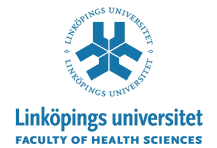 |
Visa svensk kursplan |
|
COURSE CATEGORY Fristående kurs MAIN FIELD OF STUDY Ämnesövergripande - ÖÄA SUBJECT AREA |
COURSE CODE | 8FA107 |
LEARNING OUTCOMES
On successful completion of the course, the student will be able to
• distinguish between foundational principles in design and empirical sciences
• assess the utility and limitations of information infrastructures and typical databases in health services
• evaluate the merit and scope of different design methodologies in information system development
• assess ethical, and security issues in public health informatics
• essential concepts and theories within Public Health Informatics
• infrastructure for the management of data and information within health care
• health information access
• dissemination of health information and user-oriented aspects
• design methodologies
The course is given in such a way that both men’s and women’s experiences and knowledge are foregrounded and developed.
The educational methods include lectures, working teams, and seminars, and web based education.
Re-examination for a student who has failed to pass an examination may take place on a scheduled re-examination date, which is notified at the beginning of the semester, or at the next available regular examination date.
After failing two examinations students are entitled to support and study guidance from the educational staff.
Students who have failed the course or part of the course twice are entitled to request another examiner for the following examination occasion.
Extent of re-examination
The extent of a re-examination shall be similar to the regular examination
Entries for examinations
Rules for entries for examinations are given in the course information. In addition the "Regulations regarding examinations and examiners" laid down by decision of Linköping University (Dnr LiU 1109/00−40) apply.
Applicants with a degree from a non-Swedish university must enclose an official examination certificate of at least three years of full-time studies in relevant subjects.
Documented knowledge of English equivalent to ”Engelska B”; i.e. English as native language or an internationally recognized test, e.g. TOEFL (miminum scores: Paperbased 550 + TWE-score 4.0, computerbased 213 and internetbased 79), IELTS, academic (minimum score: Overall band 6.0 and no band under 5.0), or equivalent.
The course is carried out in such a way that both men’s and women’s experience and knowledge is made visible and developed.
|
||||||||||||||||||||||||||||||||||||||||||||||||||||||||||||||||||||||||||||||